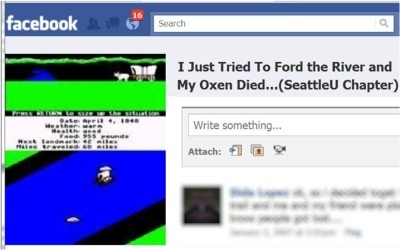Details: Immediacy and Authenticity
One interesting phenomenon was that four of the seven narrators in this subset—Springer, Dauterman, Anonymous, and Musgrave—mention the computer game Oregon Trail specifically, recalling it as a game they used to play on school computers. Unlike the other games various narrators refer to, Oregon Trail stands out as the game that several contributors in this group mention. This coincidence is striking, and it is interesting to speculate on the reasons for Oregon Trail’s prevalence in this group of narratives and what it might mean. Ito describes Oregon Trail as an "evergreen" game, which despite its age (it was first released in 1971) continued to be extremely popular with teachers and parents throughout the 1990s because of their widespread belief in its ability to apply math, reading, and history concepts in a genuinely fun game context (38, 43).
Oregon Trail may stand out as a significant computer touchstone for young adults like Anonymous—who states that Oregon Trail is memorable because it was the “funnest” part of her early computer memories—because the game, as Ito notes,
placed academic knowledge in a meaningful context of historical simulation in a way that departed from the standardized school curriculum and testing demands of most schools. As children consider how best to manage rations and supplies and to proceed along a simulated journey with real-world referents, academically relevant content is mobilized as one relevant component of decision making. (43)
Educational researcher Philip Molebash also observes how Oregon Trail serves as a touchstone for college-age education students learning to integrate technology into the classroom, noting that the student-teachers he studied—like the college students in these DALN narratives—discuss their own experiences with computers in school in terms of playing the game (419-20). In these DALN narratives, the unusual prevalence of references to Oregon Trail may indicate, as Ito and Molebash suggest, that the mention of this specific program allows the narrators to identify with audience members or indicates their membership in a particular generation of computer users who grew up playing the game during the 1990s. In this sense, the narrators’ mention of Oregon Trail functions as a generational topos. Parallel references can be found in pop culture, which often take the form of plays on common causes of avatar death in Oregon Trail like dysentery and wagon mishaps, such as this example of an ironic Facebook group page. The humor in a text like the Facebook page depends on a group of age-peers with the insider knowledge to understand the of referential in-joke, the same kind of insider knowledge the narrators appeal to when they refer to playing Oregon Trail as children.



